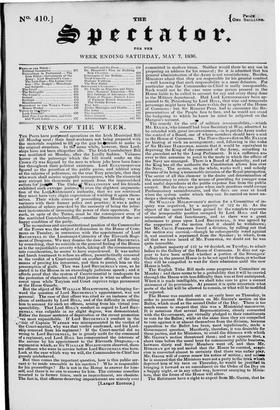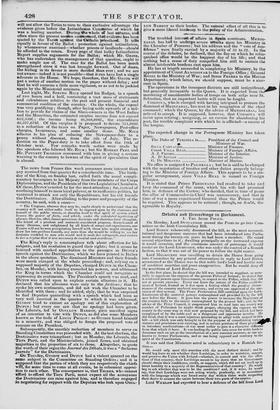NEWS OF THE WEEK.
THE Peers have postponed operations on the Irish Municipal Bill till Monday next; their head-workman not being prepared with the materials required to fill up the gap he *tends to make in the original structure. In thl mean while, however, their Lord- ships have not been altogether idle. The Irish Constabulary Bill was mutilated on Monday, after the Lordly fashion. Virtuous horror at the patronage which the bill would confer on the Crown (!) was feigned by the men to whom jobs have been fami- liar throughout their political existence. Lord ELLENBOROUGH figured as the guardian of the public purse, and nibbled away at the salaries of policemen, on the true Tory principle, that they who work shall receive niggardly recompense, while the sinecurist may extract his thousands per annum from the impoverished suitors for! just**. The Duke 41( WELLINGTON and his friends exhibited such extreme jealousfEt even the slightest augmenta- tion of the LortlAieutenant's authority, that we are convinced they must have very slight expectation of wielding it again them- selves. Their whole course of proceeding on Monday was at variance with their former policy and practice ; it was a paltry exhibition of spleen provoked by the necessity of being the reluc- tant instruments of increasing the power of their opponents. For such, in spite of the Tories, must be the consequence even of the mutilated Constabulary.Bill,—another illustration of the un- happy condition of the party. The anomalous and unconstitutional position of the Commander of the Forces was the subject of discussion in the House of Com- mons on Tuesday, in connexion with the appointment of Lord BRUDENELL to the Lieutenant-Colonelcy of the Eleventh Regi- ment of Dragoons. We may dismiss the case of Lord BRUDENELL by remarking, that we coincide in the general feeling of the House as to the unjustifiable severity which, taking all the circumstances into consideration, he seems to have experienced. It was unfair and harsh treatment to refuse an officer, parenthetically censured in the verdict of a Court-martial on another officer, of the only means of proving his innocence, and then to punish him on the presumption of guilt. This was Lord BRUDENELL'S case, as he stated it to the House in an exceedingly judicious speech ; and it affords proof that the system of Courts-martial is inadequate for the protection of character, and that justice is what no officer can count upon while Toryism and Court caprices reign paramount at the Horse Guards.
But the object of Sir WILLIAM MOLESWORTH, in bringing for- ward the question of Lord BRUDENELL'S appointment, was not personal. The case of that officer was cited as an instance of the abuse of authority by Lord HILL, and of the difficulty in calling him to account for such an offence, arising from his virtual irre- sponsibility. That Lord HILL'S conduct in regard to Lord Ban- DENELL was culpable in no slight degree, was demonstrated. ...Either the former sentence of deprivation or the recent promotion 'vas most unjustifiable. If Lord BRUDENELL'S conduct in the of Captain WATHEN was misrepresented in the verdict of the Court-martial, why was that verdict confirmed, and his Lord- ship removed from his regiment? If the Court-martial did no wrong to Lord BRUDENELL, he is grossly unfit for the command of a regiment, and Lord HILL has compromised the interests of the service by his appointment to the Eleventh Dragoons,—a regiment in which, as Sir WILLIAM MoLEswoirru observed, there are officers who were in service before Lord BRUDENELL was born. Look at the case which way we will, the Commander-in-Chief has grossly misbehaved.
But then comes the important question, bow is this public ser- vant to be made amenable to his masters ? Who is responsible for his proceedings? He is not in the House to answer for him- self, and there is no one to answer for him. The extreme remedies resorted to in former times, such as impeachment, are obsolete. The fact is, that offences deserving impeachment are scarcely ever
(LATIST EDITION.] committed in modern times. Neither would there be any use in proposing an address for his removal ; for it is admitted that his general administration of the Army is not unsatisfactory. Besides, Ministers admit that they are responsible for his general conduct —well knowing that such responsibility is a mere delusion. For particular acts the Commander-in-Chief is really irresponsible. Such would not be the case were some person present in the House liable to be called to account for any and every thing done in the Military department. Had Lord LONDONDERRY been ap- pointed to St. Petersburg by Lord HILL, that wise and temperate personage might have been there to this day in spite of the House of Commons : but Sir ROBERT PEEL had to encounter the Re- presentatives of the People face to face, and he would not stand the badgering to which he knew he must be subjected on the
Marquis's account. .fe
The remedy for the evil of military irresponsibility,—which Mr. ELLics, who himself had been Secretary at War, admitted to be attended with great inconveniences,—is to put the Army under the control of a Board, one of whose members should have a seat in the House of Commons. The Times throws dirt on Mr. EL Lies for hinting at such an arrangement ; and, following in the wake of Sir HENRY HARDINGE, asserts that it would be equivalent to depriving the King of the command of the Army, according to the precedent set by the Long Parliament. It is a sufficient an. swer to this nonsense to point to the mode in which the affairs of the Navy are managed. There is a Board of Admiralty, and yet the King has all the authority the Constitution allows him over the Navy. The system, on the whole, works well ; and nobody dreams of its being a treasonable invasion of the Royal prerogative. The secret of all this clamour is the desire and determination of the aristocracy to retain the means of providing for younger sons and useful dependents at the public expense free from the public control. But the days are gone when such practices could escape Parliamentary animadversion, and the days are near at hand when the system under which they can be carried on must un- dergo a thorough reform. Sir WILLIAM MOLESWORTH'S motion for a Committee of in- quiry was negatived, by a majority of 322 to 42. As the object of the mover had been gained by the complete exposure of the irresponsible position occupied by Lord HILL and the misconduct of that functionary, and as there was a great reluctance to press upon Lord BRUDENELL, it was agreed by the supporters of the motion that it should be withdrawn; but Mr. CECIL FORESTER forced a division, by calling out that the motion was carried,—though he subsequently voted against it, and received a reprimand from the Speaker; to which, from all that we have heard of Mr. FORESTER, we doubt not he was quite insensible. A gallant majority of 132 to 90 decided, on Tuesday, to admit ladies to the Gallery of the House of Commons. It does not ap- pear to have been settled whether a portion of the Strangers' Gallery in the present House is to be set apart for them, or whether they will be compelled to wait for their admission until the new House is built.
The English Tithe Bill made some progress in Committee on Monday : and there seems to be a probability that it will be carried through the House with less difficulty than was at first anticipated. When it is made intelligible, we shall take care to give a correct statement of its provisions. At present it is quite uncertain what parts of the bill will be allowed to remain, or what will be modified or rejected. The House was counted out at an early hour on Thursday, hi order to prevent the discussion on Mr. Gaorrei motion on the Ballot, which stood as the second Order of the Day. There is too much reason to suspect that this was a Ministerial manoeuvre. It is notorious that several Representatives, closely connected with the Government, are virtually pledged to their constituents to vote for the Ballot; while at the same time they are compelled to vote against it or absent themselves from the division, because opposition to the Ballot has been, most injudiciously, made a Government question. Manifestly, therefore, it was desirable for these parties, and for Ministers, to avoid the dilemma with which Mr. GROTE'S motion threatened them; and as it appears that, a short- time before the usual hour for commencing public business, between thirty and forty Members went off, and then Mr. HORSMAN got up and moved that the House be counted, suspi- cion is converted almost to certainty that there was unfair play. Mr. GROTE will of course renew his notice of motion ; and unless he is assured that the Ministers were not a party to the trick whish deprived him of his turn on Thursday, he would be justified in bringing it forward as an amendment on the Order of the Day on a Supply night, or in any other way, however annoying to Minis- ters, that the forms of the House will allow. The Reformers have a right to expect from Mr. GROTE, that he will not allow the Tories to turn to their exclusive advantage the evidence given before the Intimidation Committee of which he was a leading member. During %tie whole et last autumn, and often since the present session commenced, that evidence has been quoted by the Tories against the Catholic priesthood. It tells equally in favour of the Ballot : protection against intimidation, by whomsoever exercised—whether priests or landlords—should be afforded to the voters. Every page of that bulky Intimidation Report supplies arguments for the Ballot; which Mr. GROTE, who has undertaken the management of that question, ought to make ample use of. The case for the Ballot has been much strengthened since it was last brought forward. Out of doors, the feeling in its favour is more decided than ever ; and we are not aware—indeed it is not possible—that it can have lost a single advocate in the House. We hope, therefore, that Mr. GROTE will put a notice of another motion on the paper without delay ; and that he will exercise a little more vigilance, so as not to be jockied again by the Ministerial retainers. Last night, Mr. SPRING Rica opened his Budget, in a speech of two hours and a half, containing a vast mass of statements and calculations relative to the past and present financial and commercial condition of the country. On the whole, the exposé was very gratifying ; though, after laying aside upwards of a mil- lion to provide for claims of the Slave-owners in the West Indies and the Mauritius, the estimated surplus income does not exceed 662,330/.; the income being 46,980,0001., the expenditure 46,317,670/. Of this surplus it is proposed to devote 351,000/. to a reduction of the taxes on Paper, Newspapers, Post-office charges, Insurances, and some smaller items. Mr. RICE adheres to his plan of reducing the Newspaper-duty to a penny without discount, from the 5th of July. The re- duction on the Paper-duty is to take effect from the 10th of October . next. Few remarks worth notice were made by the speakers who followed Mr. Rica; but Sir ROBERT PEEL and Mr. Powder/. THOMSON concurred with him in giving a serious warning to the country to beware of the spirit of speculation that is abroad.



























